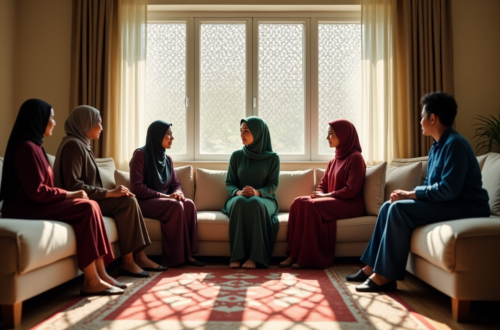In many societies, marriage is considered a significant milestone, symbolizing stability, commitment, and the foundation of a family. While marriage is undoubtedly a beautiful institution, the undue pressure and stigma surrounding late marriages for Muslim women can be overwhelming and unjust. This blog explores the roots of this stigma, its effects, and how we can work collectively to challenge and eliminate it.
Join India’s leading Muslim Matrimonial platform, salaamsoulmate.com, and connect with your perfect match today!
Understanding the Stigma Around Late Marriages for Muslim Women
The idea that a Muslim woman should marry at a young age often stems from cultural norms rather than religious obligations. While Islam encourages marriage and highlights its virtues, it does not impose a specific age or timeline for tying the knot. The Prophet Muhammad (peace be upon him) himself emphasized the importance of mutual consent, compatibility, and intentions over societal pressures or age.
Unfortunately, societal expectations have shifted the narrative. Late marriages for Muslim women are often perceived negatively, with questions about the woman’s character, choices, and desirability. Families face intrusive inquiries, women are subjected to unsolicited advice, and their accomplishments outside marriage are overlooked.
The Impact of Stigmatizing Late Marriages
The stigma around late marriages for Muslim women manifests in various harmful ways, including emotional, psychological, and even professional consequences.
- Emotional Pressure and Self-Worth
Constant questions about marriage can lead to feelings of inadequacy and self-doubt. Women may feel as though they are “failing” their families or communities, even when pursuing meaningful careers or education. - Career and Education Choices
Many women delay marriage to focus on education or their careers. However, this choice often results in judgment rather than support. Their achievements are overshadowed by concerns about their “marriageability.” - Family Tensions
Families often bear the brunt of societal scrutiny, leading to internal conflicts. The pressure to “marry off” their daughters can result in strained relationships and rushed decisions. - Mental Health Struggles
The stigma can take a significant toll on mental health, leading to stress, anxiety, and depression. The constant need to justify one’s life choices can be exhausting and isolating.
Challenging the Stigma: A Collective Responsibility
Fighting the stigma of late marriages for Muslim women requires a collective effort, involving families, communities, and individuals. Here are actionable steps we can take:
1. Educating Communities About Islamic Teachings
One of the most effective ways to combat the stigma is to highlight Islamic teachings on marriage. Islam does not prescribe a specific age for marriage; instead, it emphasizes qualities like piety, compatibility, and mutual respect. Communities must shift their focus from superficial timelines to fostering healthy and meaningful relationships.
2. Encouraging Open Conversations
Breaking taboos starts with open, honest conversations. Families should create safe spaces where women feel supported to discuss their goals, fears, and aspirations without judgment. Similarly, community leaders and influencers can use their platforms to address the stigma and promote acceptance.
3. Celebrating Diverse Life Choices
Achievements beyond marriage deserve recognition and celebration. A Muslim woman’s worth is not defined solely by her marital status but also by her contributions to society, her character, and her faith. Highlighting success stories of women who have excelled in their fields despite societal pressures can inspire others to pursue their dreams unapologetically.
4. Supporting Mental Health Initiatives
The stigma of late marriages often results in psychological distress. Communities should prioritize mental health awareness, offering support groups and counseling services to women dealing with societal pressures. Encouraging self-care and resilience can empower women to navigate these challenges with confidence.
5. Challenging Harmful Narratives
Media and popular culture play a significant role in shaping perceptions. By promoting inclusive narratives that reflect the realities of late marriages for Muslim women, we can challenge stereotypes and normalize diverse timelines for life milestones.
Dispelling Myths Around Late Marriages for Muslim Women
Several myths perpetuate the stigma surrounding late marriages. Let’s debunk some of the most common misconceptions:
- “Women who marry late have fewer prospects.”
This assumption undermines the importance of compatibility and shared values. A later marriage can often result in a more mature, stable relationship, built on mutual understanding and respect. - “Late marriages are un-Islamic.”
Islam does not dictate an “ideal” age for marriage. The decision is personal and should be based on readiness, compatibility, and intention rather than arbitrary timelines. - “Late marriages compromise family planning.”
Advances in healthcare and fertility treatments have made family planning more flexible than ever. Moreover, not every marriage must result in biological parenthood; adoption and other forms of caregiving are equally valid paths to building a family. - “Society will never accept it.”
Societal norms evolve with time. As more women embrace their individuality and challenge the status quo, perceptions will shift. The change begins with individuals who refuse to conform to outdated expectations.
Inspiring Stories of Resilience and Success
Many Muslim women have defied societal expectations and thrived despite the stigma of late marriages. Their journeys serve as powerful reminders that marital status does not define one’s worth or potential.
Dr. Aisha’s Journey
Dr. Aisha dedicated her twenties and early thirties to medical school and humanitarian work. Though she faced criticism for delaying marriage, she eventually met her spouse through shared volunteer work. Today, they are partners in both life and service, proving that timing is less important than alignment in values.
Sarah’s Career Milestones
Sarah, a software engineer, was often told that her career ambitions would “intimidate potential suitors.” She persisted in her field, earning multiple awards for innovation. Sarah married at 36, to a man who admired her passion and drive.
These stories challenge the narrative that late marriages hinder happiness or success.
Shifting the Focus to Individual Fulfillment
Rather than emphasizing societal expectations, the focus should shift to individual fulfillment and faith. Marriage is a deeply personal decision, and the journey to finding a compatible partner should be guided by one’s readiness, not external pressures. Communities that prioritize personal growth, spiritual well-being, and mutual support can foster healthier attitudes toward late marriages for Muslim women.
Read More on Islamic Marriage
Conclusion
The stigma surrounding late marriages for Muslim women is deeply ingrained but not insurmountable. By educating ourselves and others, celebrating diverse life paths, and challenging harmful narratives, we can create a more inclusive and supportive environment. Every Muslim woman deserves the freedom to choose her path, guided by faith and personal conviction rather than societal expectations.
Late marriages for Muslim women are not a failure or a flaw—they are a testament to the unique journeys that shape our lives. Together, let us celebrate these journeys and ensure that no woman feels diminished or devalued because of her marital timeline.






